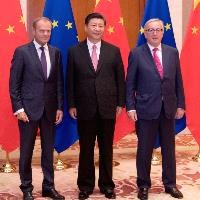(BEIJING) – China needs to take responsibility for global problems of overcapacity in the steel and aluminium sectors, and conform to stricter rules on state aid, the European Union said at a summit in Beijing Monday.
At the Summit, the EU and China confirmed support to the ‘rules-based, transparent, non-discriminatory, open and inclusive multilateral trading system’ with the WTO as its core and committed to complying with existing WTO rules. They also committed to co-operating on the reform of the WTO to help it meet new challenges, and established a joint working group on WTO reform to this end.
Regarding steel, both sides agreed to strengthen their cooperation in the Global Forum on Steel Excess Capacity and committed, in accordance with decisions of the 2016 Hangzhou and 2017 Hamburg Summits, as well as with the 2017 Ministerial decisions, to the goal of implementing the agreed political recommendations.
“We expect all our partners to respect international rules and commitments that they have taken, notably within the framework of the World Trade Organisation”, said the EU Commission’s president Jean-Claude Juncker in a speech at an EU-China Business Roundtable: “At the same time, it is true that the existing WTO rules do not allow unfair practices to be dealt with in the most effective way, but instead of throwing the baby out with the bathwater, we must all preserve the multilateral system and improve it from within.”
The Joint Summit Statement agreed by the European Union and China illustrates the breadth and depth of the EU-China relationship and the positive impact that such a partnership can have, in particular when it comes to addressing global and regional challenges such as climate change, common security threats, the promotion of multi-lateralism, and the promotion of open and fair trade.
In addition to the Joint Statement, a number of other concrete deliverables were agreed, including:
- a Leaders’ Statement on Climate Change and Clean Energy, where the EU and China committed to step up their cooperation towards low greenhouse gas emission economies and the implementation of the 2015 Paris Agreement on climate change;
- an exchange of offers on the Comprehensive Agreement on Investment, a key project towards establishing and maintaining an open, predictable, fair and transparent business environment for European and Chinese investors;
- a Partnership Agreement on Oceans;
- a Memorandum of Understanding on Circular Economy Cooperation;
- a Memorandum of Understanding to Enhance Cooperation on Emissions Trading;
- agreement to conclude before the end of October, if possible, the negotiations on an Agreement on Geographical Indications, cooperation on, and protection from imitation for distinctive food and drink products;
- an Action Plan concerning China-EU Customs Cooperation on Intellectual Property Rights (2018-2020), with the aim of strengthening customs enforcement to combat counterfeiting and piracy in the trade between the two.;
- a Memorandum of Understanding between the European Investment Fund and the Silk Road Forum confirming the first co-investment carried out under the recently established China-EU Co-Investment Fund;
- a Strategic Administrative Cooperation Arrangement and an Action Plan (2018-2020) between the European Anti-Fraud Office (OLAF) and the General Administration of China Customs



